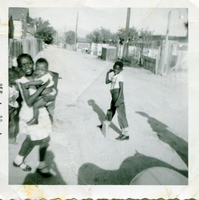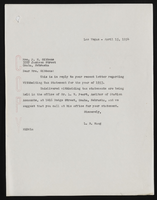Search the Special Collections and Archives Portal
Search Results
Ruth Eppenger D'hondt oral history interview
Identifier
Abstract
Oral history interview with Ruth Eppenger D'hondt conducted by Claytee D. White on August 25, 2011 and July 9, 2012 for the African Americans in Las Vegas: a Collaborative Oral History Project. Eppenger D'Hondt discusses her family's restaurant business on Jackson Street. She also discusses what it was like to be one of first black families to live in Berkley Square.
Archival Collection
Eunice Claxton oral history interview
Identifier
Abstract
Eunice Claxton oral history interview conducted by Claytee White on June 4, 5, and 10, 2015 for African Americans in Las Vegas: a Collaborative Oral History Project. Claxton discusses living in Reno and Las Vegas, Nevada, attending the Westside School, working as shield in El Morocco nightclub, and memories of Jackson Street life.
Archival Collection
Shirley Edmond Papers
Identifier
Abstract
The Shirley Edmond Papers (approximately 1950-2019) contain newspaper clippings, magazines, and church bulletins related to Edmond's civic participation over the years. The collection also contains photographs and ephemera related to the Johnson family and their business on Jackson Street on the Westside, Johnson's Malt Shop. Shirley Edmond grew up on the Westside, and was the first African American woman in Southern Nevada promoted by the United States Post Office to be a supervisor. She also worked at Matt Kelly Elementary School.
Archival Collection
Agnes Marshall oral history interview
Identifier
Abstract
Oral history interview with Agnes Marshall conducted by Claytee D. White on September 12, 2011 for the African Americans in Las Vegas: a Collaborative Oral History Project. Marshall discusses her family being one of the first families to move into Berkley Square, the first middle-class black housing development designed by Paul Williams. She also recounts her experiences with the nightlife in Las Vegas, Nevada during the heydays of Jackson Street, including clubs such as Cotton Club and Town Tavern, and restaurants like Mom's Kitchen.
Archival Collection
Rosa Lee Brewer, Maxine Westby, and Angelia Carter oral history interview
Identifier
Abstract
Oral history interview with Rosa Lee Brewer, Maxine Westby, and Angelia Carter conducted by Claytee D. White on April 17, 2019 for the Boyer Early Las Vegas Oral History Project. In this interview, Brewer discusses her early life in Birmingham, Alabama and moving to Las Vegas, Nevada in 1957. Brewer and Westby remember living in the Westside, J Street and Jackson Street businesses, and the issue of homelessness in that area. Later, Brewer, Westby, and Carter discuss the schools on the Westside and school integration. Lastly, Brewer, Westby, and Carter discuss changes in the Westside.
Archival Collection
Mary Wesley oral history interview
Identifier
Abstract
Oral history interview with Mary Wesley conducted by Claytee D. White on October 22, 2007 for the UNLV University Libraries Oral History Collection. In this interview, Wesley discusses her early life in Quitman, Mississippi. She recalls the racism she experienced during her youth, the church community in Quitman, and traveling to Las Vegas, Nevada by train. She talks about the welfare rights movement in Las Vegas, Operation Life, and businesses on Jackson Street. Lastly, Wesley describes the entertainment on the Westside, and integration on the Las Vegas Strip.
Archival Collection
Ricky Lee Towers oral history interviews
Identifier
Abstract
Oral history interviews with Ricky Lee Towers conducted by Claytee D. White on May 02, 2017 and May, 24 2017 for the African Americans in Las Vegas: a Collaborative Oral History Project. In the first interview, Towers discusses his upbringing in Las Vegas, Nevada and growing up in the Westside. He describes businesses on Jackson Street, the opening of the Moulin Rouge, and his experience as an African American card dealer. Towers talks about organized crime influences in the gaming industry, and the decrease of business on the Westside. In the second interview, Towers discusses the redevelopment of the Historic Westside community.
Archival Collection
Tyrone L. Seals oral history interviews
Identifier
Abstract
Oral history interviews with Tyrone L. Seals conducted by Claytee D. White and Sarah Beth Hawkins on April 25, 2016 and May 16, 2016 for the African Americans in Las Vegas: a Collaborative Oral History Project. In the first interview, Seals discusses his upbringing in Las Vegas, Nevada and growing up in the Westside. He talks about experiencing discrimination, employment limitations, and entertainment on Jackson Street. In the second interview, Seals remembers school integration, organizations for African American women, and protests during the 1960s. Lastly, Seals discusses the significance of religion in the African American community and becoming a pastor.
Archival Collection

Photograph of Dell Ray Rhodes with her brother an an unidentified male child in Westside Alley, 1955
Date
Archival Collection
Description
Dell Ray Rhodes with her brother in the alley behind her grandmother's house , between Monroe and Jackson Streets in 1955. (as featured with oral history transcript)
Image

